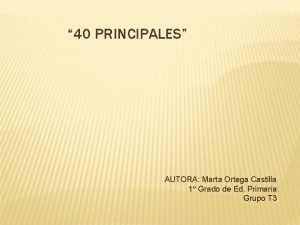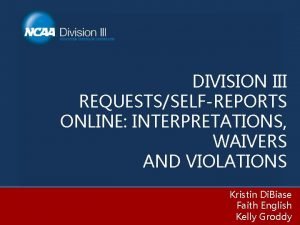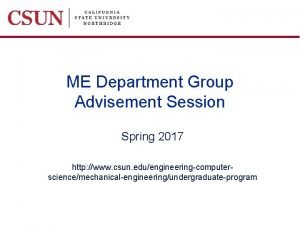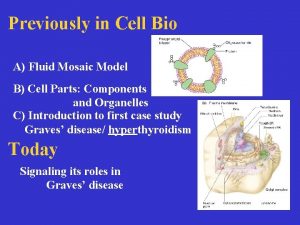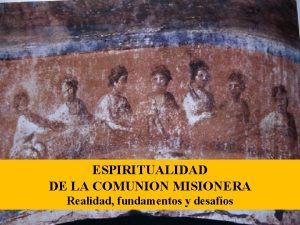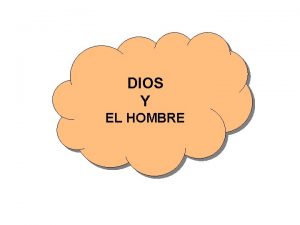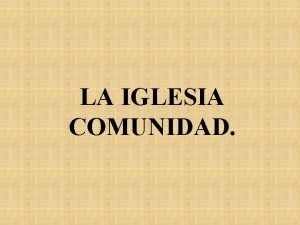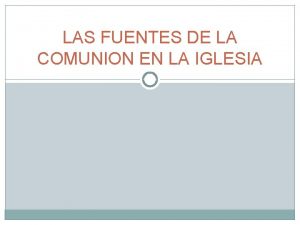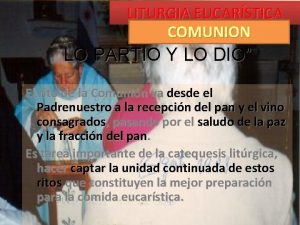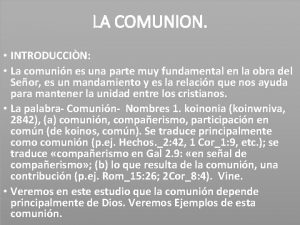Previously The Comunion of God God is the















- Slides: 15


Previously … • The Comunion of God: God is the communion of self-giving love. • The Communion of the Church: God the Son became man in Christ to bring human beings into communion with God. It is through the Catholic Church that Christ does this. • Baptism: Baptism is the way we are made part of the Church’s communion • The Apostolic Ministry: Christ founded his Church in the Apostles, and we can be sure that those churches that have a line of bishops going back to the first apostles belong to the ‘one, holy, catholic and apostolic Church’.

Session 5 (part 1): Living a Catholic Life After a time of disagreement and tension, the recovery of love involves a recollection of common identity and mutual belonging. We are Anglicans because this is where God has placed us, but also because we rejoice in the catholic tradition that we have inherited as Anglicans. An important feature of that tradition is that the Church of England modestly claims only to be ‘part’ of the one Church. The third Guiding Principle acknowledges this. The statement enumerates the contributions to the life of the Church of England that we can make. We also see ourselves as called to assist the Church of England in fulfilling its ecumenical commitment. Communion and Catholicity in the Church of England, section 4 – summary

Theory: Is it sexist to oppose women’s ordination? • For this to be true, we would have to believe that bishops and priests were superior to lay people. But the Catholic faith teaches that the Church’s ministry serves the faithful: that’s what ‘minister’ means (consider Eucharistic Prayer II: ‘…giving you thanks that you have held us worthy to be in your presence and minister to you’ (serve you in the old translation). • For this to be true, we would have to have a choice in the matter. But we don’t: as we saw, the nature of the Apostolic ministry was determined by Christ, and has been accepted by the Catholic Church throughout its existence • Jesus’s world was full of female priests, and nothing could have been more natural than for a new religion to have both men and women in priestly roles. Also, Christ overturned so many other cultural & religious norms – to the extent that he was crucified – that it is unlikely that he would have been too timid to call women apostles if he believed it right to do so.

Practical Challenges (1) • The vast majority of Anglicans believe in the ordination of women. How can you claim to be Anglican, and not accept it? • Actually, many Anglicans worship in churches that do not ordain women priests and Bishops (for example the Church of the Province of Central Africa does not). Even though the Church of England permits women’s ordination, it acknowledges that the traditionalist position is within the spectrum of its teaching.

Practical Challenges (2) • The issue of the ordination of women is over • The Five Guiding Principles make it clear that this is not so. Whilst Catholics in the Church of England must acknowledge (not necessarily agree with!) the clear decision that has been made, the House of Bishops Declaration makes it clear that decision must be set in the broader context of the whole Anglican Communion and the Roman Catholic and Orthodox Churches.

The 5 Guiding Principles 1. Now that legislation has been passed to enable women to become bishops the Church of England is fully and unequivocally committed to all orders of ministry being open equally to all, without reference to gender, and holds that those whom it has duly ordained and appointed to office are the true and lawful holders of the office which they occupy and thus deserve due respect and canonical obedience; 2. Anyone who ministers within the Church of England must be prepared to acknowledge that the Church of England has reached a clear decision on the matter; 3. Since it continues to share the historic episcopate with other Churches, including the Roman Catholic Church, the Orthodox Church and those provinces of the Anglican Communion which continue to ordain only men as priests or bishops, the Church of England acknowledges that its own clear decision on ministry and gender is set within a broader process of discernment within the Anglican Communion and the whole Church of God; 4. Since those within the Church of England who, on grounds of theological conviction, are unable to receive the ministry of women bishops or priests continue to be within the spectrum of teaching and tradition of the Anglican Communion, the Church of England remains committed to enabling them to flourish within its life and structures; 5. Pastoral and sacramental provision for the minority within the Church of England will be made without specifying a limit of time and in a way that maintains the highest possible degree of communion and contributes to mutual flourishing across the whole Church of England. They need to be read one with the other and held together in tension, rather than being applied selectively

Session 5 (part 2): the policy and pastoral guidance of The Society • Where there is doubt about sacraments, Christians must take the safest course. • For Traditional Anglicans, the ministry of women priests and bishops is not free from doubt. • We need a ministry that is free from doubt, and that allows us to fully participate in the Communion of the Church, which is, as we learnt in earlier sessions, the Communion of God. • Therefore, we require male priests, ordained by male Bishops in the succession of bishops going back to the first Apostles. • This is why the Bishops of the Society ‘can only commend the sacramental ministry of male priests who have been ordained by a male bishop who stands in the historic apostolic succession of bishops at whose episcopal ordination a male bishop presided. ’ • Before 2015, all traditional Anglicans in England had to do to access this ministry was to seek male priests. Now, we need to seek the Bishops, priests, and parishes of the Society.

A practical note on the communion of the Church

The model developed: the Universal Church

The model developed: the Universal Church • Within The Society, the situation is clear: this model can function fully, and everybody is in full Communion • When the Bishop is a woman, the situation is equally clear: communion is impaired. In order to follow the ‘safest way’, catholics cannot receive the sacraments of such a bishop, nor those of the clergy (men and women) she ordains. • What about a male bishop, ordained in the apostolic succession, who ordains women? And what about male priests, ordained in the apostolic succession, who accept the ordination of women? Here, the situation is more complicated. We cannot share full communion with them … but we can recognise the validity of their sacraments. • How, then, should we behave?

The policy and pastoral guidance of The Society Normally, holy communion is received within a context of full ecclesial communion. For the clergy and people of The Society, this will mean receiving communion in parishes that are affiliated to The Society or at celebrations of the Eucharist at which Bishops and Priests of The Society preside. There can be occasions when it is appropriate (though none should feel compelled) for our clergy and people to receive communion from validly ordained bishops and priests who do not belong to The Society. This would give expression to our commitment to living in the Church of England in the highest possible degree of communion and charity. We are particularly conscious of the situation of those who identify with The Society but live at some distance from one of our parishes. At an ordination, those who are ordained and those who share in the laying of hands must receive communion. In all other circumstances, the decision as to whether to receive communion on any occasion from a validly ordained bishop or priest must be a decision for the person concerned, as a matter of conscience. A Catholic Life in the Church of England – section 6

Charity We are traditionalists because only as such can we respond to Christ’s invitation to Communion with Him through His Church. In this Communion we give ourselves to Christ, and to our brothers and sisters in Him. The same Christ whose will we believe to have been frustrated by the Church of England’s decisions about its ministry calls us to love our fellow Christians. Though we pray for the time when the Church of England will return to the full communion that is Christ’s will for it, it is out of charity that we do so, and we should act charitably towards those who believe themselves called to receive and exercise the sacramental ministry of women.

Questions • What practical effect does the ordination of women Bishops have on my churchgoing? What sort of changes will be necessary in my life as a traditionalist in the Church of England because of it? • Do I behave charitably towards those of the other integrity? Are there any relationships I need to repair, or begin, with them?

Concluding Prayer John Keble, along with Bl. John Henry Newman and Edward Bouverie Pusey, was responsible for the Church of England’s recovery of its Catholicism in the nineteenth century. This prayer is given in the Church of England’s liturgy for use on the day of his commemoration: Father of the eternal Word, in whose encompassing love all things in peace and order move: grant that, as your servant John Keble adored you in all creation, so we may have a humble heart of love for the mysteries of your Church and know your love to be new every morning, in Jesus Christ your Son our Lord, who is alive and reigns with you, in the unity of the Holy Spirit, one God, now and for ever. Amen
 Comunion en la diversidad
Comunion en la diversidad Que es la comunión cristiana
Que es la comunión cristiana Beneficios de escuchar la voz de dios
Beneficios de escuchar la voz de dios Comunion picasso
Comunion picasso Cuáles son las tres partes del rito de la confirmación
Cuáles son las tres partes del rito de la confirmación Precursores del cubismo
Precursores del cubismo Versiculos de primera comunion
Versiculos de primera comunion Mariam savabi
Mariam savabi Rsro online
Rsro online Mse 227 csun
Mse 227 csun Economic importance of eubacteria
Economic importance of eubacteria Cách giải mật thư tọa độ
Cách giải mật thư tọa độ Chụp tư thế worms-breton
Chụp tư thế worms-breton ưu thế lai là gì
ưu thế lai là gì Tư thế ngồi viết
Tư thế ngồi viết Thẻ vin
Thẻ vin



